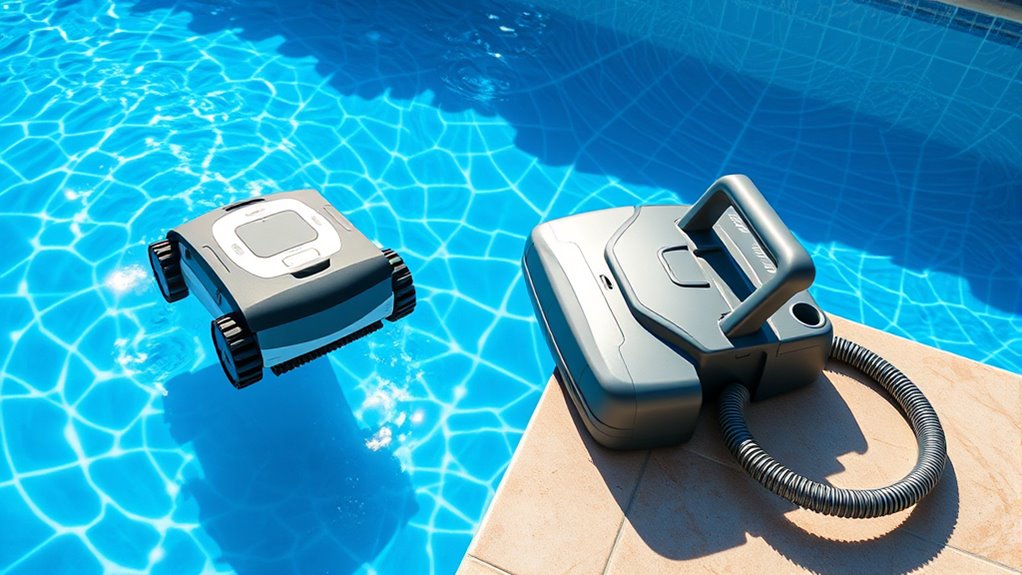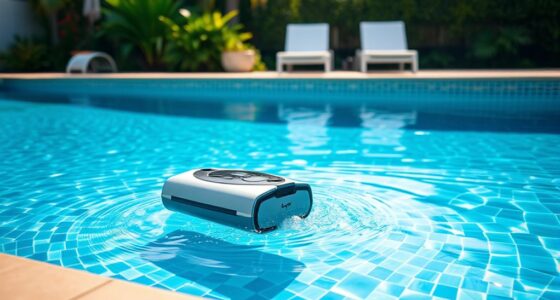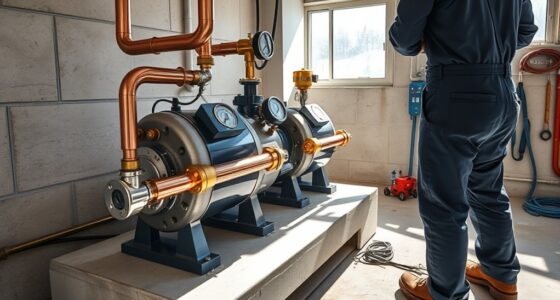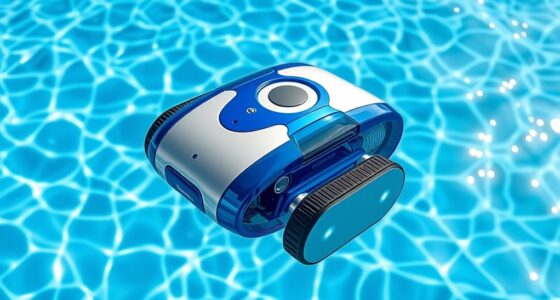Robotic pool cleaners offer high automation, thorough cleaning, and energy efficiency, but come with a higher upfront cost and maintenance needs. Suction cleaners are more affordable, easy to operate, and rely on the pool’s filtration system, but may struggle with small particles and detailed spots. If you want smart technology and top performance, robotic models are ideal; for simpler cleanup on a budget, suction cleaners work well. Keep exploring to find the best fit for your pool.
Key Takeaways
- Robotic cleaners offer automation, thorough coverage, and smart features but come with higher upfront costs and maintenance expenses.
- Suction cleaners are affordable, simple to operate, and depend on the pool’s filtration system, but may struggle with detailed cleaning.
- Robotic models are more energy-efficient and customizable through scheduled operations, while suction cleaners rely heavily on existing filtration.
- Robotic cleaners provide consistent, automated cleaning with advanced navigation, reducing manual effort.
- Suction cleaners are cost-effective and easier for small pools, but less effective at cleaning corners and small particles.
Advantages and Disadvantages of Robotic Pool Cleaners

Robotic pool cleaners offer a range of benefits that make them an attractive option for many homeowners, but they also come with some drawbacks. One major advantage is their automation efficiency, as they clean pools with minimal supervision and can operate on scheduled times. This saves you time and effort while ensuring consistent cleaning. Additionally, their high cleaning performance allows for thorough removal of dirt and debris from various pool surfaces. The integration of advanced navigation technology can enhance their ability to cover the entire pool area more effectively. Moreover, energy efficiency is another benefit, as many robotic cleaners consume less power compared to traditional suction or pressure cleaners. Newer models also often include smart features that enable remote monitoring and control via smartphone apps, increasing user convenience. The inclusion of Bluetooth connectivity further simplifies the process of pairing and controlling these devices. However, their maintenance costs can be higher than manual options, primarily due to regular part replacements and occasional repairs. While robotic cleaners are designed to be durable, the initial investment can be steep, and keeping them in top shape requires ongoing upkeep. Despite these costs, many find the convenience and thorough cleaning capabilities worth the expense, especially considering the time saved and consistent performance they deliver.
Benefits and Drawbacks of Suction Pool Cleaners

Suction pool cleaners are popular for their affordability and simplicity, making them an appealing choice for many homeowners. They typically have decent filter efficiency, catching dirt and debris effectively, but may struggle with smaller particles. Maintenance requirements are generally low; you’ll need to regularly clean or replace the filter bag and check the hose for blockages. Additionally, GMC tuning can enhance the overall performance of your vehicle, ensuring your car operates at its best. However, they rely on your pool’s filtration system, which can affect cleaning performance if the system isn’t powerful enough. Suction cleaners also tend to be less thorough in corners and along walls compared to robotic cleaners. Despite these drawbacks, they’re easy to operate and cost-effective, making them suitable for smaller pools or those on a budget. Just remember, upkeep and filter management are key to ideal cleaning results. Additionally, understanding credit card terms can help homeowners manage their finances more effectively, especially when considering investments in pool maintenance equipment. For example, choosing a model with a high-efficiency filter can improve cleaning results and reduce maintenance frequency. Utilizing proper filter media can also optimize debris capture and prolong filter life.
Frequently Asked Questions
Which Type of Cleaner Is More Energy-Efficient?
When choosing a pool cleaner, you wonder which is more energy-efficient. Generally, robotic cleaners tend to have lower energy consumption because they operate independently and often have energy-saving features. This means less environmental impact over time. Suction cleaners may use more power since they rely on your pool pump, increasing energy use. So, if you want to minimize environmental impact, a robotic cleaner could be the smarter choice for efficiency.
How Do Maintenance Costs Compare Over Time?
You might think maintenance costs are a small detail, but they actually play a big role in your pool’s cost efficiency. Over time, robotic cleaners often surprise you with higher long-term expenses due to their complex parts and tech updates. Suction cleaners, while simpler, tend to have lower ongoing costs. So, if you want to keep expenses in check, consider how each option’s maintenance will impact your overall budget.
Can Both Cleaners Handle Large Debris Effectively?
Both cleaners can handle large debris, but their debris capacity and cleaning speed vary. Robotic cleaners typically have a smaller debris capacity, so you may need to empty them more often; however, they often clean faster and navigate around obstacles better. Suction cleaners generally have a larger debris capacity, making them better for big debris, but their cleaning speed can be slower. Choose based on your debris size and how quickly you want the pool cleaned.
Are Robotic Cleaners Suitable for All Pool Shapes?
Robotic cleaners are quite versatile when it comes to pool shape adaptability, making them suitable for most designs, from irregular to standard shapes. They often feature customization options, allowing you to adjust their cleaning patterns for maximum coverage. This flexibility guarantees thorough cleaning regardless of your pool’s shape. However, some models might struggle with very complex or uniquely shaped pools, so checking specifications before purchasing can help you find the best fit.
Which Cleaner Offers Better Navigation in Complex Pool Layouts?
Think of your pool like a maze, and you want a cleaner that’s a savvy explorer. Robotic cleaners typically offer better navigation accuracy, thanks to advanced obstacle detection sensors that help them maneuver complex layouts smoothly. They can adapt to tricky corners and tight spots, making them ideal for intricate pool designs. Suction cleaners tend to follow more straightforward paths, so if your pool’s layout is complicated, a robotic cleaner’s navigation skills will serve you best.
Conclusion
So, now that you’ve met the robotic marvels and the humble suction heroes, it’s clear they each have their quirks. Whether you want a high-tech pool nanny or a simple suction sidekick, your choice paints a picture—perhaps of a pool battle royale, with robotic arms arm-wrestling algae or suction cups clinging like barnacles. Whichever you pick, just remember: your pool’s fate is in your hands, and maybe in a slightly over-engineered robot’s too.









